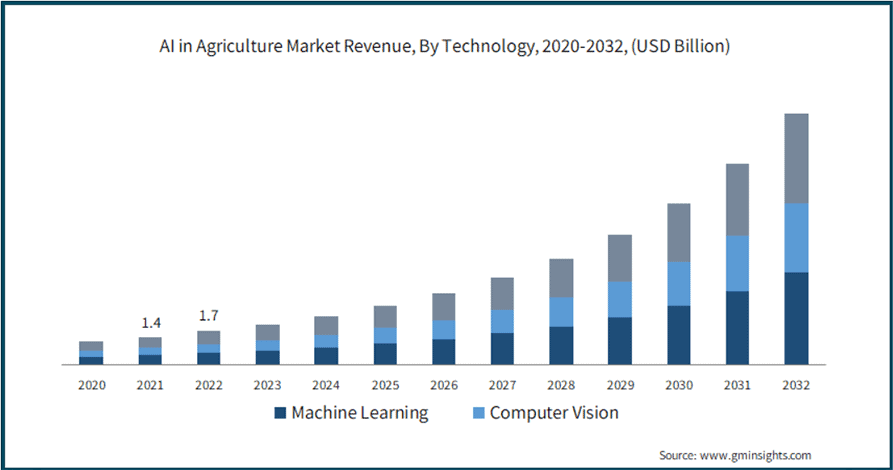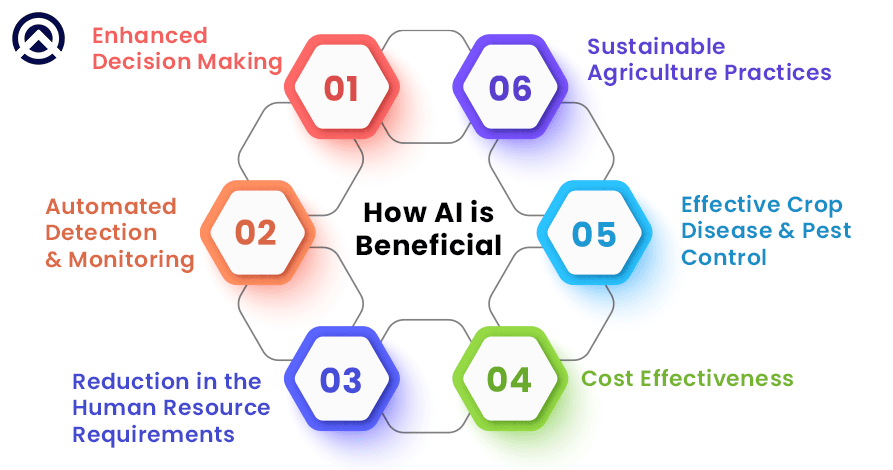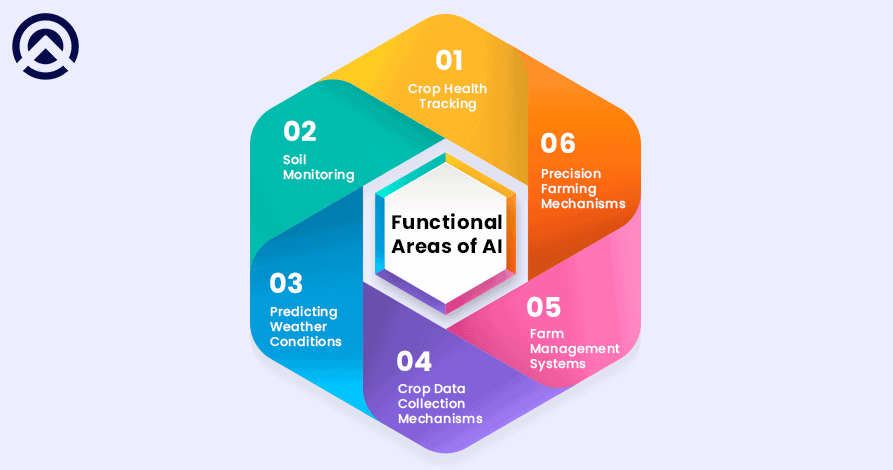AI in Agriculture: Paving the Way for Smart Farming Solutions
Farming is one of the major sectors that is contributing to the growth of different economies globally. The intervention of various technologies in previous years has influenced and optimized the agricultural industry to an extent. Smart farming technologies like Artificial intelligence have driven drastic changes toward agricultural growth. We all are aware of the importance of the agriculture industry with the growth in the population size and decreasing number of agricultural land. Smart farming solutions are the ones that help individuals get higher crop yields without causing any harm to the environment. It leads to enhancing the capabilities of the farms. This is the place where AI technology in agriculture plays an important role. Due to the limited availability of agricultural land in the upcoming future we humans will be facing a huge scarcity of food-related needs.
Here artificial intelligence technologies and machine learning are helping individuals to fulfill crop-yielding requirements. Revolutionizing farming techniques and enhancing the level of production. Still, the work is in progress, the scientists are working on the same for correctly utilizing the AI in agriculture smart farming. Artificial intelligence in agriculture helps individuals reduce their efforts and grow healthier crops. Not only these but other aspects like crop monitoring, automated pest control, and soil efficiency monitoring can be achieved after the implementation of AI. it also generates real-time data analytics for the same enabling them to perform the multitasking.
Blog Highlights
With this blog, we will be going to understand and explore a wide range of applications based on artificial intelligence that leads to the transformation agricultural sector. Focusing on how it enhances the yield predictions, with continuous monitoring of soil and crops and enhancing the yield quality. Offering the individuals with precise farming techniques.
Some Statistical Contemplations
According to the analytical data generated by a well-renowned market insight website that is “Global Market Insights”, their derived research consideration confirms that AI in agricultural market from machine learning has recently recorded a CAGR rate of approximately 20%, and this rate is expected to increase by 15% in the upcoming years till 2032. In the year 2032, its growth rate is expected to be approximately 35%. This is only because of the rise in technological considerations in the agricultural sector. These detailed insights showcase the graph that shows the upward trend in the agricultural industry and market. Due to the same situation, the growth rate of the smart farming solutions development services will also be witnessing growth in the coming years.

How Artificial Intelligence is the Cure for the Farming Challenges
Implementing AI technology in agriculture was earlier a challenging task for the experimenters as there were not such huge transformations in the technological sector. The latest technological transformations and adoption of AI in agricultural sector lead to optimizing and enhancing the crop-yielding process without engaging a lot of physical effort. Here’s how AI is helping the farmers cure all the farming-related issues:

1. Enhanced Decision Making
With the help of AI-based smart farm software that provides you a predictive analysis, after monitoring the soil conditions and other aspects of farming. It provides the farmers with a complete process of farming so that farmers can process the farming operations rapidly. Artificial Intelligence technology Solutions automatically analyze the current pricing trends, market demand analysis, and the correct timing to start sowing the seeds on the farms.
2. Automated Detection & Monitoring
Continuously monitoring the soil health, weather prediction insights, recommendations about the needs of fertilizers, and other resources required for efficient crop yielding and monitoring the crop’s growth. All such automated detection and monitoring factors enable the farmers to clearly understand the proper way of crop-yielding, enhancing the mechanism of their crop-yielding and produce. It is one of the key benefits of smart farming with the implementation of artificial intelligence for the same.
3. Reduction in the Human Resource Requirements
We all know that farming is the toughest and effort-oriented process requiring a wide range of human resources. Similarly, human resources can be costly in most countries and several farmers can’t afford the same. However, with the implementation of AI technology in agriculture the need for the human resource is reduced. As it automates a wide range of operations and processes. With the help of AI-based solutions like smart irrigation systems, crop monitoring systems, automated machinery for sowing and harvesting crops, and many other smart farming solutions, farm owners, generate higher yields without the need for manual labor, thus saving their costs.
4. Cost Effectiveness
Artificial intelligence leads to the utilization of fewer resources in farming resulting in the minimization of costs. The AI technology automates several processes through its advanced algorithms. Even complex processes such as soil management, data management, generation, and crop production management. All these processes require a lot of resource allocation, resulting in higher costs of production. AI can save such costs for you by automating all the processes and only allocating the necessary resources for farming.
5. Effective Crop Disease & Pest Control
Crop diseases and pest control are the two major issues that are highly faced by farmers. The threat of pests and diseases can arise at any point in time to the crops. Leads to the mass destruction of the yields of the farmers. However, by adapting the artificial intelligence phenomenon, AI algorithms can easily predict disease and pest outbreaks in the crops, And through early detection, you can easily save your crops from such issues. Allowing the farmers to implement the necessary measures minimizing the need to spread harmful pesticides to the crops.
6. Sustainable Agriculture Practices
Sometimes farming and crop-yielding procedures lead to the degradation of the environment. Especially when you are up for traditional farming practices. Artificial intelligence-based smart farming techniques lead farmers to produce higher yields without any sort of environmental degradation. The AI ensures the automated allocation of resources like, seeds, water, fertilizers, and pesticides only at the time when it is required by the crops after analyzing the requirements. This reduces the wastage of such natural resources and encourages the users for organic farming practices leading to total sustainability for the same.
Also Read: Unlock the Power of AI in Manufacturing: Use Cases and Examples
Functional Areas of AI in Agriculture
Implementing the concept of agriculture smart farming leads to a change in the overall tradition of farming, delivering the farmers with higher yields without any of the losses. Here are some of the key areas where implementing Artificial intelligence with smart farming technologies has offered the best results to the farmers.

1. Predicting Weather Conditions
Weather conditions play an important role in the yielding of crops. The farmers must consider such conditions to generate higher yields of crops. Artificial intelligence-based smart farming solutions automatically detect the weather conditions with the air quality index and analyze the same for the farmers. After this analysis, it generates the timing and suitability of such conditions according to the type of crop that the farmer needs to yield.
2. Soil Monitoring
Soil is a majorly essential element that plays an important role in the yielding of crops when it comes to the agricultural sector. However the soil doesn’t always stay in the same condition, it witnesses slight changes with time. Artificial intelligence-based smart farm software is capable enough to monitor the conditions of soil by analyzing its nutrition levels. Providing the farmers with in-depth analysis of the soil to make them aware of which soil will be the best for their desired crop.
3. Crop Health Tracking
AI-enabled crop health tracking mechanisms allow farmers to constantly monitor the health of the crops. Such mechanisms also provide the methodologies starting from the sowing of seeds to monitoring the crop conditions. Crop monitoring can help farmers easily detect the conditions of their crops and the necessary measures that they have to take for better production. Optimizing the profitability and growth rate of the crop. Integrating such mechanisms in AI mobile application development offers overall crop health monitoring to the hands of the farmers. Since the same can be done over the smartphones.
4. Precision Farming Mechanisms
AI contributes extensively to precision farming, a contemporary method that optimizes useful resource utilization for maximum efficiency. Mechanisms such as drones with AI-powered imaging systems can capture high-resolution pics of crops, detecting variations in plant fitness and health. AI algorithms analyze this visible data to create detailed maps, enabling farmers to pick out unique areas that require their consideration, inclusive of pest attacks on crops or nutrient deficiencies. Subsequently, farmers can utilize the necessary measures, decreasing the need for pesticides or fertilizers and minimizing the environmental impact on the crops.
5. AI-Based Farm Management Systems
AI-powered farm management system helps farmers make well-informed decisions related to crop yields. These systems detect the conditions of the farm and provide the measures that they need to take to improve the quality of the soil. These solutions improve the yields and ease the farming operations for the farmers, removing all the hassles for the same. As a result, the farmers can easily generate higher profits from their crops without incurring a lot of amount for the same.
6. Crop Data Collection Mechanisms
With the help of AI technology in agriculture and machine learning mechanisms the crops can be grown through an improvised mechanism. For instance, AI-based drones can easily detect the condition and health of the crops after which they deliver the actual data about the same. This data can be further utilized for doing the improvizations in the health conditions of the crops. Not only the drones but the data detection sensors can also detect the fertilizing and watering patterns and also the moisture and nutrient levels of the crop yields. Making the yield more improvised and best in class.
Also Read: The Role of Large Language Models in the Healthcare Industry in 2024
Final Words
Technological upgradation over the years has transformed a lot of sectors globally. One such sector is the agriculture sector. We completely understand that the global population levels keep on growing daily. That’s the reason behind the increase in the need for agriculture just because the world is dealing with the problems in agricultural production. The most efficient solution for the same problem is to implement smart farming technologies like AI in agriculture. AI-based smart farm apps can help you the same by automating almost every agricultural operation.
The enhanced growth in Artificial intelligence is enabling you to achieve a lot of things whether you implement them in your business or agricultural field. Amplework Software, a well-renowned AI development company in USA, is contributing to the agriculture sector by delivering AI-based mobile application development services. Integrating the most efficient technologies for improvisation of the crop yields. Our team of mobile app developers is skilled and efficient enough to tailor customized solutions that best fit your business needs and requirements, driving the best results.
You May Also Read:- Beauty and Wellness App Development
Frequently Asked Questions
What are the Benefits of Smart Farming Solutions?
There are numerous advantages of AI in farming solutions like automated weather & crop condition tracker, soil condition detection, Crop monitoring and analysis, automated crop management, reducing the need for labor, and many other aspects.
How AI-based solutions can control the crop disease and pests?
Artificial intelligence technology solutions offer a proactive approach to controlling crop diseases and pests, As these solutions continuously monitor crop health and generate data related to the same. Helping the farmers to save their crops from both pests and different diseases, resulting in higher yields.
How do AI-based agriculture solutions contribute towards sustainability?
AI facilitates sustainable agriculture by guiding precision farming practices, ensuring optimal resource utilization. It also supports the transition to agroecological practices by analyzing relationships between crops, soil, and biodiversity, balancing productivity with environmental stewardship.


 sales@amplework.com
sales@amplework.com
 (+91) 9636-962-228
(+91) 9636-962-228





